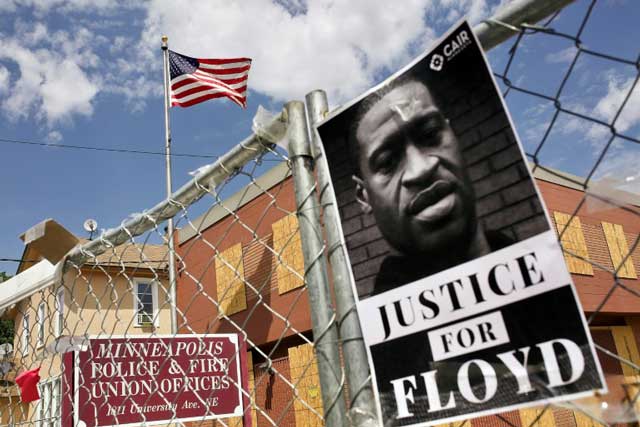
Minneapolis, United States | AFP | As he watched the video of George Floyd’s dying moments, martial arts instructor Andre Balian recognized the white police officer kneeling on the black man’s neck for nearly nine minutes.
“There’s no perceivable way that he could not know what kind of damage he was either doing or capable of doing in that situation,” Balian said of Derek Chauvin, the now ex-officer who has been charged with murdering Floyd in Minneapolis.
“A knee on someone’s neck that’s on the ground could be like a killing blow if it’s applied with a harsh amount of force.
“He knew what he was doing and that it was wrong, and they better not let him off the hook for it,” said Balian, who still teaches at the Southern Praying Mantis Kung Fu Association where he encountered Chauvin two decades ago.
Chauvin, who spent 19 years on the Minneapolis force before being sacked over Floyd’s killing, racked up 17 complaints during his career, including one when he yanked a woman from her car for a minor speeding offense.
While Balian was shocked to watch the video of Floyd’s death on May 25, he recalled his unease about Chauvin as a student, describing him as a “jerk” who would stand with arms folded and glare at those around him.
James Butcher, an expert in psychological screening exams for aspiring police officers, said anyone capable of such violence should never have been recruited in the first place.
“It’s very difficult to believe that someone who was supposed to be screened for mental health issues or mental health problems would engage in that extensive physical abuse against another person,” Butcher told AFP.
– Personality disorders –
An emeritus professor at the University of Minnesota, Butcher’s work for 40 years has focused on a standardized psychological test that assesses personality traits and mental problems. Called the Minnesota Multiphasic Personality Inventory (MMPI), it is used internationally to weed out unfit police applicants, although not all departments use it.
“If he was given the MMPI, in all likelihood he would have shown up on the MMPI as having personality problems, personality disorders, antisocial features, and so forth,” Butcher said.
“It’s very apparent that there was some problem with detecting the personality disorders that were showing up in his behavior.”
One of the three other officers who were fired and charged over Floyd’s death, Tou Thao, was the subject of six complaints in seven years. One prompted a lawsuit alleging excessive force during the arrest of a suspect whose teeth were smashed, although the case was settled out of court.
The Minneapolis force also faced questions over its screening of recruits after another of its officers shot dead an Australian-American woman, Justine Ruszczyk Damond, in 2017.
During his murder trial, prosecutors said Mohamed Noor’s pre-employment screening predicted that he would have difficulty with stressful police work as he was impatient over minor infractions and disliked interacting with people.
Noor, a Somali-American, was hired as a cadet anyway after a psychiatrist gave little weight to the test results, court records show.
Noor was jailed for 12 years and six months last year for shooting Ruszczyk Damond after she called 911 to report a possible sexual assault behind her home, hurrying out in her pajamas when the squad car arrived.
From the passenger seat, Noor reached across his partner and shot her dead without warning.
Floyd’s death has triggered nationwide calls for sweeping police reforms, including calls for funding to be slashed.
– ‘Demonized’ –
Deniz Ones, a specialist in industrial psychology at the University of Minnesota, said better pre-employment screening of police applicants “is perhaps the single most important change that needs to happen.”
Screening exams flag traits such as stress intolerance and callousness to root out prejudiced applicants, but many police departments don’t have access to psychologists who can evaluate results.
“If they’re not properly trained or properly interpreting the results, the result could be negligent hiring and more of what we’ve seen with this violence by police,” Ones said.
While Chauvin and his co-defendants have had to hand in their badges, Randy McAlister, deputy director of the Cottage Grove Police Department in a suburb of Minneapolis, said many officers feel all police are now being “demonized.”
“They’re afraid to do anything proactive now because anytime you do something proactive, you risk a conflict with somebody, and when there’s conflict, there’s a potential use of force,” he said.
“There’s a big rush to a really knee-jerk reaction to defund or demolish police departments, which is crazy to me. Very few people are considering the unintended consequences of that.”
 The Independent Uganda: You get the Truth we Pay the Price
The Independent Uganda: You get the Truth we Pay the Price


